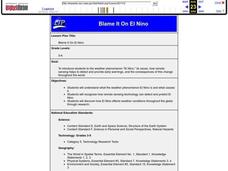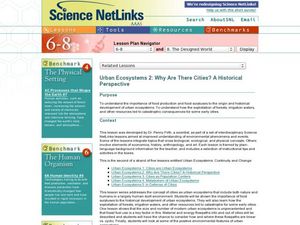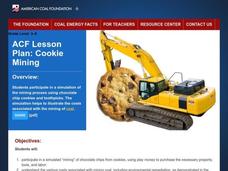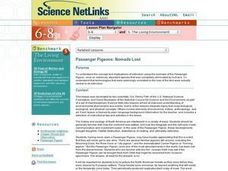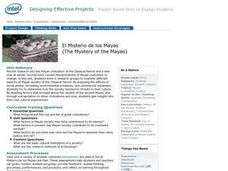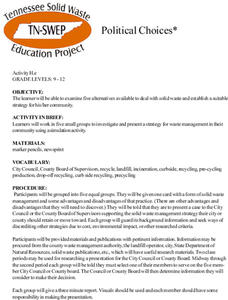Science Matters
Oh Heron
Two teams—the environmentalists and herons—play four rounds of the game, Oh Heron. Using hand symbols to represent food, shelter, and water, players locate their match to produce more herons while those unmatched decompose.
National Nanotechnology Infrastructure Network
Help or Hype: The Ethics of Bio-Nanotechnology
Ethical concerns are not always black and white. A well-designed lesson presents learners with scenarios for which ethics may come into question. Scholars learn to consider the different sides of a situation and make an unbiased conclusion.
Kenan Fellows
Saving Those Who Save Us: Exploring the Use of Sensors with Data Visualization
Sensor technology is amazingly accurate and useful. Combining the sensor technology and mathematical knowledge, scholars design experiments to answer a question they have developed. Questions may focus on light sensing, temperature...
California Academy of Science
Sustainable Water Solutions: Weighing the Pros and Cons
Switching indoor water fixtures to low flow reduces water usage by more than 45 percent. This and other solutions to reduce water usage have both pros and cons. Scholars view videos of different solutions, discuss them in small groups,...
California Academy of Science
Sustainable Food Solutions: Weighing the Pros and Cons
A growing demand for sustainable food systems comes from schools and even some cities. So what are some solutions? Scholars consider four different ways to approach sustainable food solutions and list the pros and cons of each. The fifth...
California Academy of Science
Exploring the Impacts of Feeding the World
Approximately 50 percent of people in the world who are chronically hungry work in agriculture. While it seems counter-intuitive, the farther you live from a farm, the more food options are available. Scholars explore concepts related to...
Curated OER
Acid Rain
Simulated acid rain, a dilute sulfuric acid solution, needs to be prepared for this demonstration. After a condensed lecture on acid rain, you will apply the solution to a sample of granite and a sample of limestone. Your young...
Curated OER
Blame It On El Nino
Students study the weather phenomenon El Nino is and what causes it, and recognize how remote sensing technology can detect and predict El Nino. Students discover how El Nino affects weather conditions throughout the globe through research.
Curated OER
Exploring our National Parks
Students utilize maps/Atlases to find key spatial information, locate U.S. National Parks, characterize the geography of a specific region, and create a National Park brochure.
Curated OER
Urban Ecosystems 4: Metabolism of Urban Ecosystems
Students discover that material and energy uses by a city come from outside the city boundaries. They realize that the pathway of these material is linear instead of cyclical as they are in natural ecosystems.
Curated OER
Urban Ecosystems 2: Why Are There Cities? A Historical Perspective
Students investigate the importance of food surpluses to the historical development of urban ecosystems.
Curated OER
The Mekong River
Junior geographers explore the region through which the Mekong flows, its pathway, the landscape, how people depend on the Mekong, and future uncertainties. They apply the five themes of geography to examine the region. They create a...
Curated OER
Cookie Mining
Students simulate coal mining with chocolate chip cookies and toothpicks. They investigate the costs associated with mining coal.
Curated OER
Red is the Word!
Through the use of stories, artwork, and the KidPix program, youngsters explore the color word red, and engage in activities around the word. Teaching kindergartners about the color words can be so much fun. This could be adapted for any...
Curated OER
The Birds of a Feather Flock Together
Fifth graders identify all parts of an egg, and explore their importance to the life cycle of a chicken. Learners compare all sorts of birds and place them in categories based on what they look like. This five-day lesson effectively...
Curated OER
PASSENGER PIGEONS: NOMADS LOST
Students explore the concept and implications of extinction using the example of the Passenger Pigeon, once an extremely abundant species that was completely eliminated by humans.
BBC
Rivers
The water cycle, rainfall, and the flow of water into rivers then out into the ocean are the main ideas covered here. After a teacher-led discussion and activity, learners pair off and write a commentary about the water cycle that is to...
Curated OER
Making a Cartogram
Students interpret statistical geographic information by creating a cartogram.
Curated OER
El Misterio del los Mayas (The Mystery of the Mayas)
Students, working in groups, research different aspects of the Mayan society of the classical period. They study the rise and fall of the civilization and present the information in multimedia presentations.
Curated OER
Dr. Seuss and Universal Themes
Discover some of the themes of Dr. Seuss's major books. They see that despite being written for young people, Dr. Seuss' books contain powerful messages and important themes.
Curated OER
Wetlands Are Wonderful
Learners study the characteristics of wetlands. They are introduced to terms and different examples of wetlands. The hands-on activity reinforces the different parts of the wetlands, and provides a working model of a wetland.
Curated OER
Political Choices
Students, in small groups, investigate and present a strategy for waste management in their community using a simulation activity in which each group represents a sector of their community.
Curated OER
Understanding Growth of the Phoenix Area
Students study the growth of the Phoenix area using geographic images, maps, tables, and graphs. They study the idea of community.
Curated OER
In the Wake of Columbus
Students explore how the population decreased in native cultures.
Other popular searches
- Environmental Science
- Environmental Resources
- Environmental Health
- Environmental History
- Environmentalism
- Environmental Conservation
- Environmental Issues
- Environmental Awareness
- Environmental Organizations
- Environmental Art
- Environmental Problems
- Environmental Microbiology









